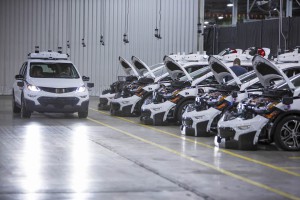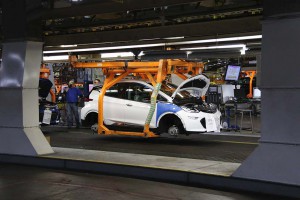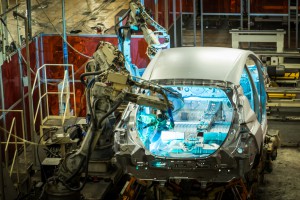Early this month, Denmark proposed that the European Union completely ban the sale of gas- and diesel-powered vehicles. Closer to home, General Motors is expected to include plans to invest billions of dollars to add production of new battery-cars as part of its eventual contract settlement with the United Auto Workers union. While there are still plenty of skeptics, there’s a growing sense in the auto industry that electric vehicles are the way of the future.
That poses plenty of problems for automakers that are investing billions in a technology that has yet to connect with the broad mass of new car buyers. And manufacturers like GM, Ford, Volkswagen and Honda aren’t the only ones worried about what the push towards electrification will mean.
While battery-cars may be good for the environment, they may pose serious concerns for workers, putting “a lot of jobs at risk,” cautions Mark Wakefield, the head of the automotive practice at consultancy AlixPartners.
(For Developing Batteries That “Revolutionized Our Lives,” Three Scientists Win Nobel)
On the whole, battery-electric cars are expected to be simpler to produce, especially when comparing electric powertrains to today’s gas and diesel drivetrains. They should also prove far simpler to maintain and service, according to Wakefield and other experts, meaning the impact on jobs likely will be felt far beyond the confines of the factory.

EVs have fewer moving parts and this generally means fewer people are needed for the assembly process.
Exactly how much of an impact the emergence of battery technology will have is expected to depend upon what type of electrified vehicles eventually gain ground.
Japanese automakers Honda and Toyota, in particular, are focusing on both conventional and plug-in hybrids. If anything, by pairing a gas engine and electric motors under the same hood, a vehicle winds up being more complicated. In a study of the European auto industry, AlixPartners estimated production of a plug-in hybrid – arguably the most complicated design – requires an average 9.2 manhours of labor for its powertrain, compared to 6.2 hours for a comparable gas vehicle.
But the general industry perspective is that, over time, pure battery-electric vehicles, or BEVs, will come to dominate. And there, the manufacturing process becomes far simpler, the study estimating an average production time of 3.7 manhours.
On the whole, electric powertrains are just a lot less complex, “and fewer parts mean fewer jobs,” agreed Jeff Schuster, president, Americas Operation and Global Vehicle Forecasting, LMC Automotive.
Exactly where this will be felt is uncertain. The most direct impact will be on both suppliers and powertrain assembly operations. But even vehicle assembly lines could feel the impact, according to industry analysts.
“There are tens of thousands of jobs involved in powertrain manufacturing, and the vast majority of those are under threat from electric cars,” warned John McElroy, a veteran automotive analyst and host of the TV show Autoline:Detroit.
(“Consumers Do Not Want to Buy or Drive” EVs? That’s Not the Story in Europe)
The potential impact doesn’t end at the factory gates, however.
With fewer moving parts, wear-and-tear is reduced, something expected to translate into less required maintenance and fewer repairs. Another study by AlixPartners estimated that a typical dealer will lose about $1,300 in maintenance and repairs for the typical EV over a five-year ownership cycle compared to what an owner would spend on a comparable gas model.
“You’ll no longer need oil changes or oil filter changes, no fan belts or tune-ups,” said McElroy. Even brakes, he added, will last longer because EVs use a system called regenerative braking where energy is recaptured and returned to a vehicle’s battery, reducing wear on brake pads and other parts.
Today’s cars already need less service than those from the 1960s and 1970s, one reason we see fewer gas stations with repair bays. But EVs could threaten even those service stations that survive. It won’t be just a matter of swapping out their gas pumps for electric chargers, according to Pasquale Romano, the CEO of Chargepoint, one of the country’s largest operators of public charging stations.
Currently, EV owners do more than 80% of their charging at home or work, according to industry data. As more battery-electric cars roll out and motorists start using them for longer trips, Romano said, there’ll be a need for a public infrastructure. Even so, “You won’t need nearly as many (public) charging stations as you have gas stations today,” he said, meaning still fewer jobs.
How fast the EV revolution will take place – and how quickly its impact on jobs will be felt – is a matter of intense debate, and it “depends on how quickly electric vehicles catch on,” said McElroy.
From a jobs perspective, the story isn’t entirely bleak. The electric vehicle revolution almost certainly will see new battery plants – like the Tesla Gigafactory in Reno, Nevada – pop up across the country. But while battery packs are fairly complex, their assembly is highly automated, requiring relatively few workers compared with what would be needed on a classic automotive line.
On the service side of the business, even today’s gas-powered models are more sophisticated than those of decades past from a digital standpoint. But tomorrow’s electric vehicles will require far more software code to operate, potentially creating new job opportunities. But that will be tempered by both their reliability – and by the fact that most manufacturers are moving, like Tesla, to over-the-air updates that would allow them to address problems with thousands, even millions, of vehicles at a time from a single location.
(You May Get the Option to Choose What Your EV Sounds Like)
So, on the whole, the battery-car revolution could sharply cut into the overall automotive workforce.



This smacks of alarmist BS. If you are manufacturing vehicles, you are manufacturing vehicles. Yes some components won’t be needed but they will be replaced by other components. Like when the carburetor was replaced by fuel injection, change begets some job replacement but creates others.
Nothing alarmist. A simple report. There will likely be fewer jobs in a number of areas within the automotive sector.
Simply the change that needs to happen if we are to survive as a society ,, all good !